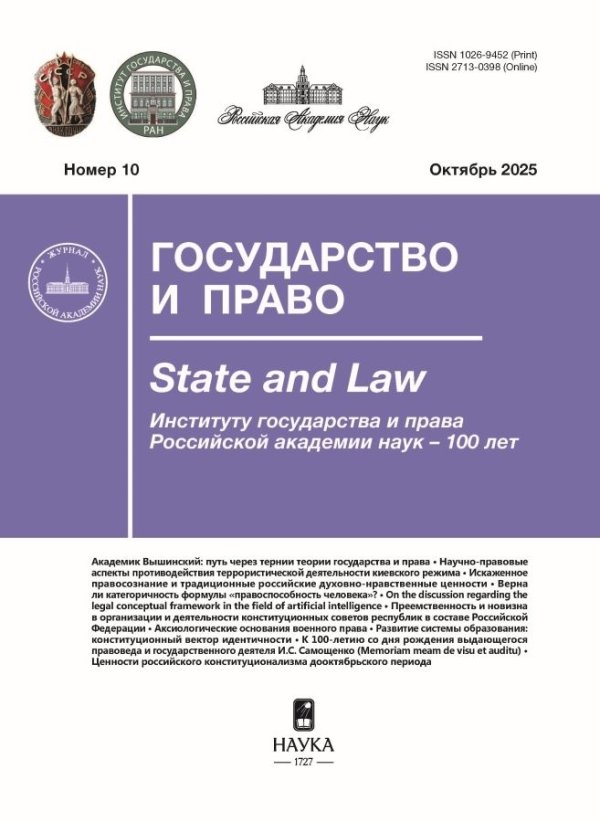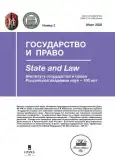The influence of domestic constitutions on the basic laws of foreign countries
- Authors: Shulzhenko Y.L.1
-
Affiliations:
- Institute of State and Law of the Russian Academy of Sciences
- Issue: No 3 (2025)
- Pages: 14-27
- Section: Important facts about legal science
- URL: https://vestnik.nvsu.ru/1026-9452/article/view/683013
- DOI: https://doi.org/10.31857/S1026945225030012
- ID: 683013
Cite item
Abstract
The article is devoted to a topic that is relevant today, mainly due to the need for an objective and truthful response to the most severe attacks by a number of NATO states, led by the United States, which have launched a war against us aimed at discrediting, distorting, and belittling Russia’s role in the global socio-political and humanitarian spheres. The article presents cases demonstrating the use abroad of the achievements of domestic state-legal institutions, positions, and scientific achievements in the pre-revolutionary period, taking into account the experience of state and local government reforms in Russia in the second half of the 19th century, using the example of similar reforms of the same time in Germany. An important role was assigned to Russia’s participation in the drafting of constitutions of foreign states, for example, the constitutions of the Ionian Islands in the late 18th and early 19th centuries, the Tarnovo Constitution of Bulgaria in 1879, and the Constitution of Serbia in 1838. The constitutions of the Soviet period were of particular interest to the foreign countries both theoretically and practically. Their influence on the basic laws of a number of Asian and European countries that embarked on the path of socialism after the Second World War is significant. In the early years, this was mainly due to the USSR Constitution of 1936. The USSR Constitution of 1977 had a huge impact on the basic laws and state-legal institutions of developing countries, primarily of a socialist orientation. There was also a certain influence of the Soviet constitutions on the constitutions of bourgeois states, especially after the Second World War. This was reflected, in particular, in the fact that the constitutions of a number of them (Greece, Spain, Portugal, etc.) included provisions on the foundations of the state system, highlighted a special group of socio-economic rights of citizens, and spoke about the unity of rights and duties of citizens, which was typical for Soviet constitutions. After the collapse of the USSR, our constitutions are not object to imitation. At the same time, a number of positions of the Soviet constitutions are reflected to a certain extent in the basic laws of Vietnam, China, Cuba, Laos, which adhere to the ideas of socialism.
Full Text
About the authors
Yuri L. Shulzhenko
Institute of State and Law of the Russian Academy of Sciences
Author for correspondence.
Email: constitution@igpran.ru
Doctor of Law, Professor, Honored lawyer of Russian Federation, Chief Researcher, Department of Constitutional Law and Constitutional Justice
Russian Federation, 10 Znamenka str., 119019 MoscowReferences
- The Algerian People’s Democratic Republic: Constitution and legislative acts / ed. by Yu. A. Yudin. M., 1983 (in Russ.).
- Foreign policy of the nineteenth and early twentieth centuries. Documents of the Russian Ministry of Foreign Affairs. Series 1. 1801–1815. M., 1960. Vol. 1. Pp. 706–727 (in Russ.).
- Voevodin L. D., Zlatopolsky D. L. State law of foreign socialist countries. M., 1984. P. 55 (in Russ.).
- States of socialist orientation / ed. by R. A. Ulyanovsky. M., 1975. Pp. 205–211 (in Russ.).
- The State charter of the Russian Empire. Warsaw, 1831 (in Russ.).
- The state law of foreign socialist countries / ed. by I. F. Kotok. M., 1957. P. 63 (in Russ.).
- Dolgorukov P. V. On the change of the way of government in Russia. Leipzig, 1862 (in Russ.).
- Selected Constitutions of foreign countries: textbook / ed. by B. A. Strashun. M., 2011 (in Russ.).
- Constitutions of European states / ed. by L. A. Okunkov. M., 2001. Vol. 1, 2 (in Russ.).
- Constitutions of foreign socialist states / ed. by V. I. Durdenevsky. M., 1956 (in Russ.).
- Constitutions of socialist states. M., 1987. Vol. 1, 2 (in Russ.).
- Korkunov N. M. Russian State Law. Vol. II. Special part. 4th ed., St. Petersburg, 1903. Pp. 385, 386 (in Russ.).
- Kukushkin Yu. S., Chistyakov O. I. An essay on the history of the Soviet Constitution. 2nd ed. M., 1987 (in Russ.).
- Marchenko M. N. Theory of the state and law. 2nd ed. M., 2005. Pp. 182–187 (in Russ.).
- Social movements in Russia in the first half of the nineteenth century. St. Petersburg, 1905. Vol. 1 (in Russ.).
- Plan of state transformations of Count M. M. Speransky. M., 1905 (in Russ.).
- Spasov B., Zhelev G. State law of the people’s Republic of Bulgaria. Sofia, 1974. Vol. 1, 2.
- Comparative Constitutional Law / ed. by A. I. Kovler, V. E. Chirkin (res. ed.), Yu. A. Yudin. M., 1996. P. 49 (in Russ.).
- Fomvikhan K. Revolution in Laos: some basic lessons and main tasks. M., 1980. P. 54 (in Russ.).
- Khabrieva T. Ya., Chirkin V. E. Theory of the modern Constitution. M., 2005. Pp. 29, 30 (in Russ.).
- Shulzhenko Yu. L. Domestic constitutionalism. Historical and legal research. M., 2010. P. 13 (in Russ.).
- Bihari A. Allamjog Bp Tankonyvkiado. 1974.
- Dordevic J. Ustavno parvo. Beograd, 1986.
- Hauriou H. Droit constitutional et institutions politiques. P., 1972. Pp. 556, 557.
- Jarosz Z., Zawadzki S. Prawo konstytucyjne. Warszawa, 1980.
- Prisca N. Drept constitutionae. Bucuresti, 1972.
- Riviere C. Guinee Mobilization of a People. L., 1977. P. 242.
- Staatsrecht der DDR. Lehrbuch. Berlin, 1978.
- Ten Years Constitutionalism in Central and Eastem Europe. Lublin, 2001. Pp. 365, 18.
- Zdobinsky S., Matousek S. a kolektiv. Statni prawo CSSR. Praha, 1985.
Supplementary files








